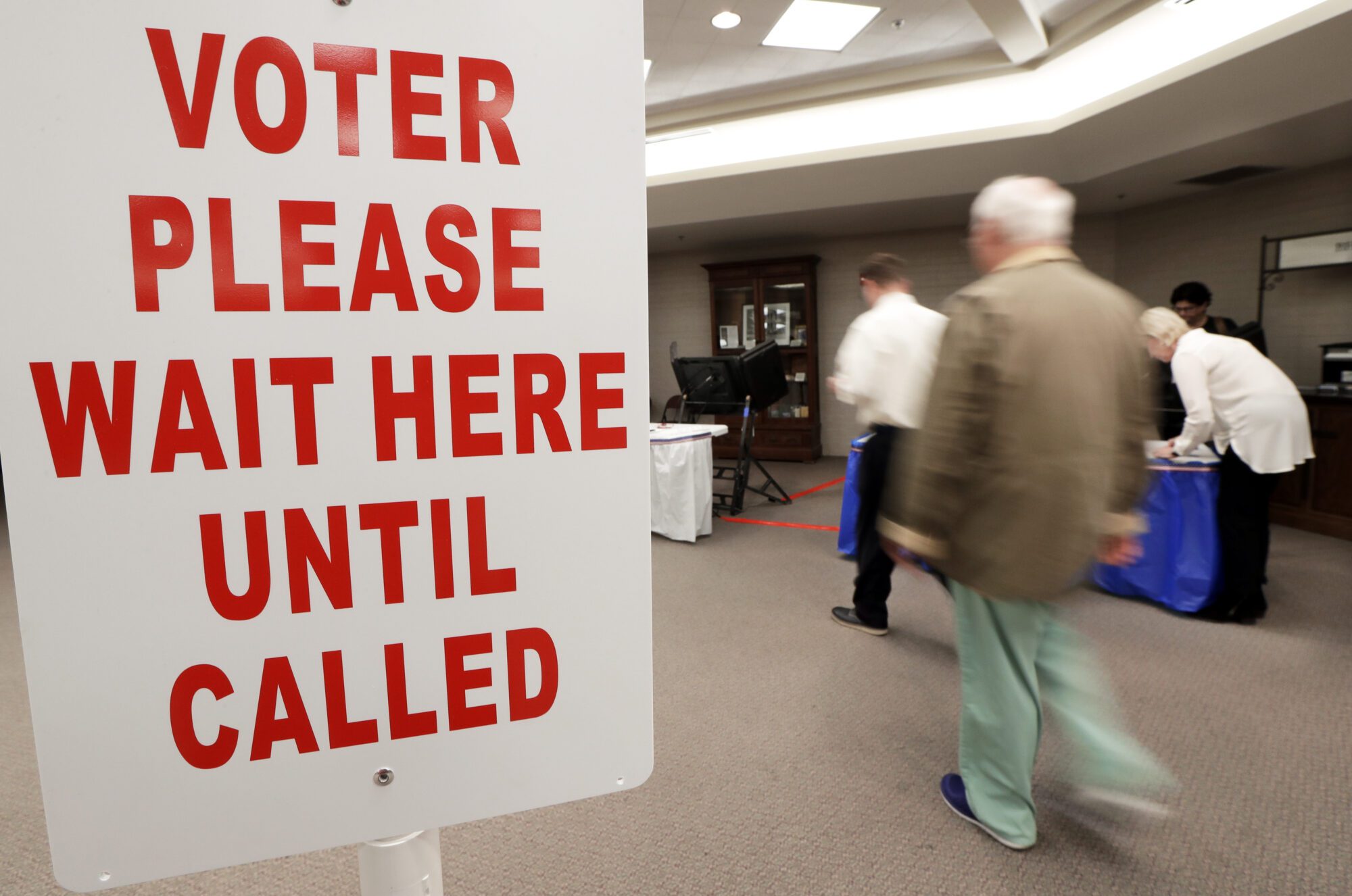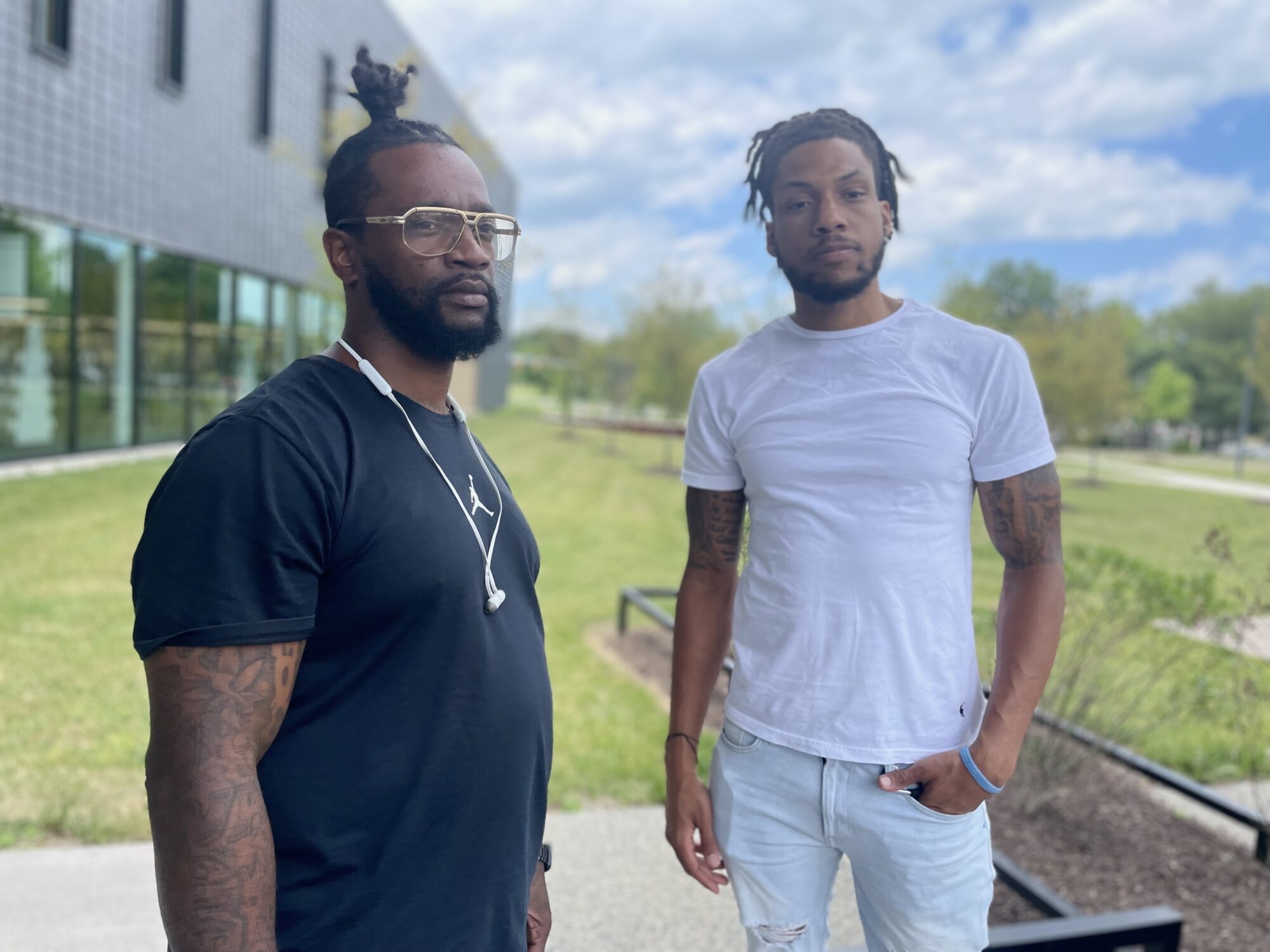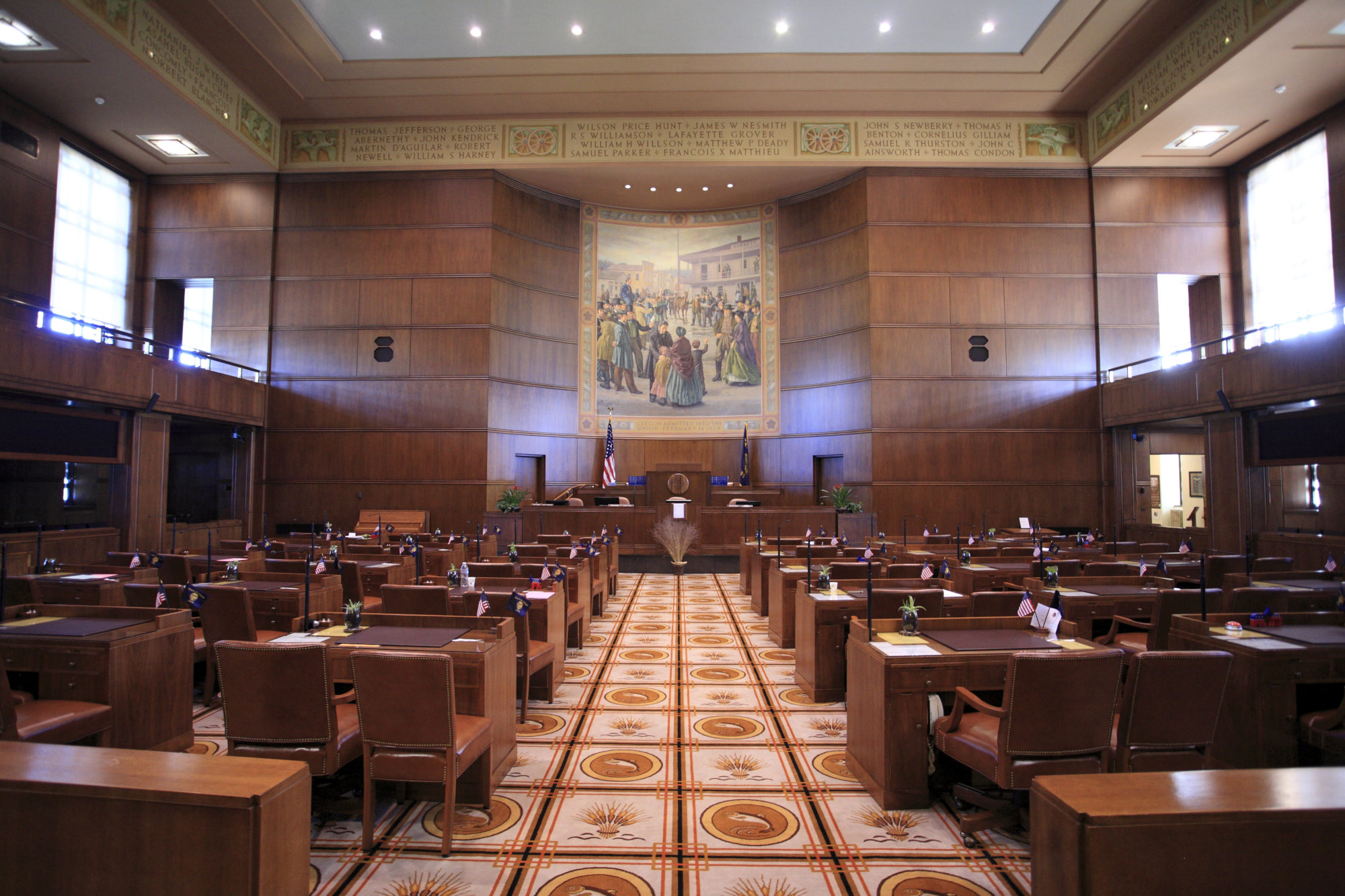Kentucky Activists Step In to Deliver on the Promise of Voting Rights Restoration
After the governor restored hundreds of thousands of people’s rights in 2019, a coalition led by formerly incarcerated Kentuckians is working to inform people of their rights.
Alex Burness | October 12, 2023
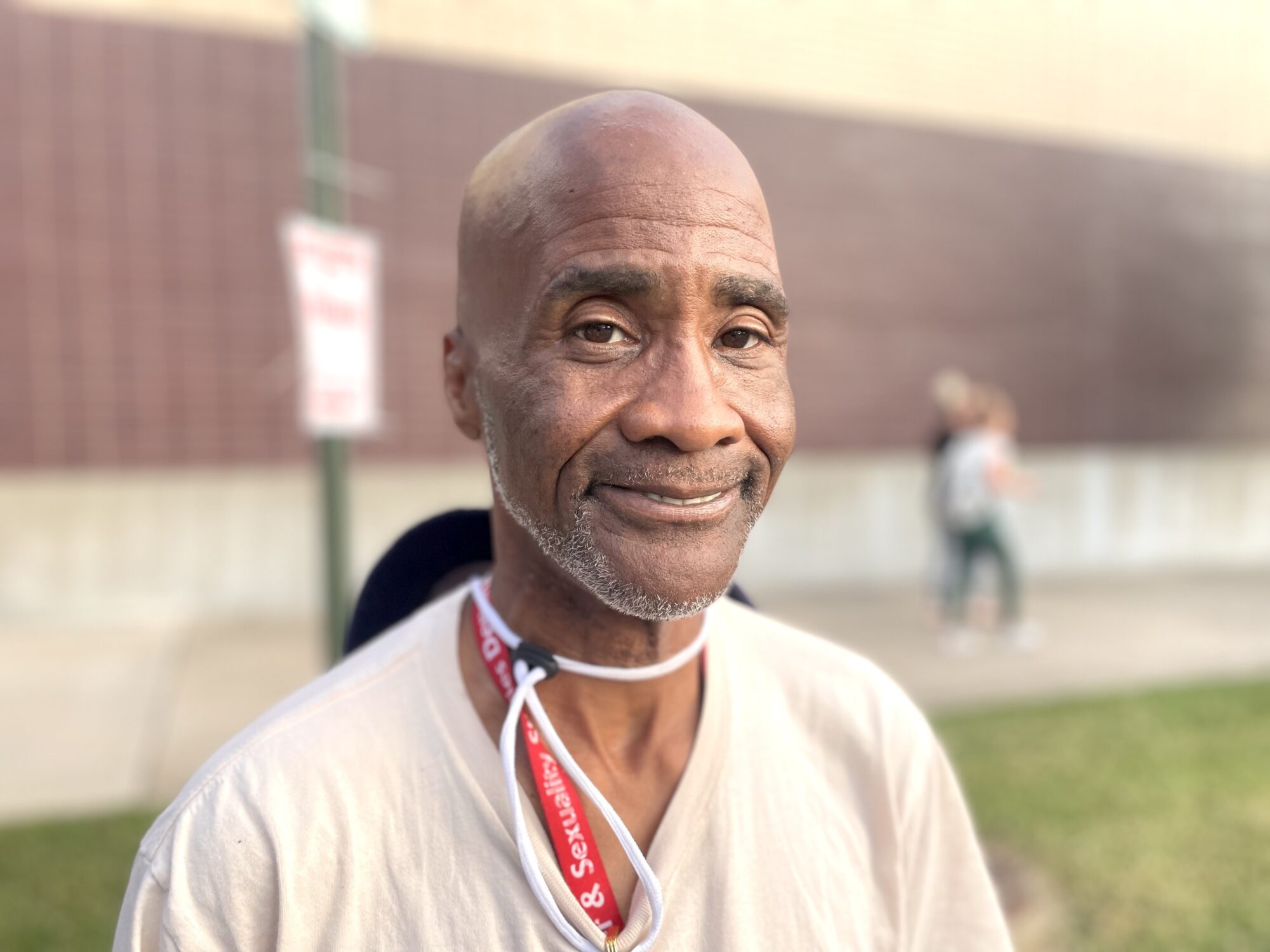

This is the final installment of Bolts’ series on the people blocked from voting due to a past criminal conviction in places that are electing their state governments in 2023. Revisit our earlier articles on Mississippi and Virginia.
Alonzo Malone Jr. says he felt “less than human” during the 27 years the state of Kentucky barred him from voting.
Malone lost his voting rights, along with his freedom and a slew of other civil liberties, in 1989 when he was convicted of a felony in his late 30s and sent to prison for three years. He fell into addiction and homelessness upon release and was sent back to prison in 1998 to serve two more years. After his second release from prison, he filed a petition to regain his voting rights, and as it languished he became active in advocating for the voting rights of others. He’d been sober and free for 16 years when, in 2016, then-Governor Matt Bevin finally restored his right to vote.
“I felt human again,” Malone said when we met in early September at the Lexington Roots & Heritage Festival, a large annual celebration of the city’s Black community, where he circulated through the crowd with a clipboard to register people to vote. “I can remember on Election Day in 2008, Barack Obama being elected. I just felt so discouraged. I could pay the taxes for the salaries of those who were making laws, but I could not cast a vote.”
Until 2019, Kentucky disenfranchised all residents convicted of any felony for life. People who hoped to regain their rights had to seek an expungement—an expensive procedure that only applies to a narrow subset of felony offenses—or they had to directly petition the governor for an individual pardon. These pardons were rarely issued: Bevin restored voting rights for only about 1,500 people during his term in office, among the more than 300,000 in the state who were disenfranchised at the time.
The outlook changed dramatically for Kentuckians with felonies in 2019, when Democrat Andy Beshear entered office with what he called a “moral responsibility” to help others like Malone. Two days after his inauguration, Beshear issued a sweeping executive order to automatically restore voting rights for people convicted in Kentucky of nonviolent crimes once they finish all parts of their sentence, including parole or probation. The order instantly restored voting rights to about 180,000 Kentuckians and sliced the state’s disenfranchised population in half.
But in practice, this massive expansion of voter eligibility has not translated into a wave of newly-enfranchised Kentuckians actually heading to the polls. In the 2022 midterm election, three years on from the executive order, only about 7 percent of people whose voting rights were restored by Beshear’s order actually cast ballots, according to the Kentucky Civic Engagement Table, a voting rights organization. That’s compared to 42 percent of the overall electorate.
Part of the blame, Kentucky’s advocates say, lies with a Beshear administration that did little to notify people affected by the order. This inaction has inspired Kentuckians like Malone to step in and inform people who are eligible to vote but may not realize it. Their project has kicked into higher gear recently, ahead of a critical November election that, as I reported last month, could lead to a reversal of Beshear’s order and a return to blanket disenfranchisement of anyone convicted of a felony.
A coalition of activists and nonprofit organizations have been using public records and word of mouth to identify people whose rights were restored, traversing the state to tell those people they have the right to vote and to encourage them to exercise it. In addition to door-to-door canvassing, this coalition scours social media, meets people in barber shops and churches, in parks and county jails, and at public events like this Lexington festival.
“I go to the laundromat. I go to the grocery stores,” said Malone, who estimates that he has personally registered more than 500 voters this election cycle alone. He is active with Kentuckians for the Commonwealth, a statewide nonprofit that favors expansion of voting rights. He added, “If I’m at the gas station, I always keep voter registrations in my car at any time, and I don’t have a problem pulling them out. I go to car washes. Anywhere I can.”
He and other activists doing this work say they constantly encounter people whose rights were restored by Beshear’s 2019 order but still don’t know it. “It’s a disgrace,” Malone said, that four years later this is still the case.
The Lexington festival is just getting going as the sun sets on a beautiful evening. R&B music blares and fragrant barbecue smoke billows from food trucks while Malone stares out to the growing parade passing by. “There are many Kentuckians who have felonies who are walking around and do not know that their rights are restored. It is my aspiration to talk to everybody here tonight,” Malone said, before heading out into the crowd, clipboard in hand.
On March 4, 2020, a few months after signing the order to restore voting rights, Beshear held a press conference in Frankfort to tout a new online search tool people with felony convictions could use to determine their voting eligibility. This, the governor said, showed he was delivering on one of his top priorities: “Restoring the right to vote to Kentuckians that have done wrong in the past but are doing right now.”
Beshear said during the press conference that his Christian faith teaches him forgiveness, and implored journalists in attendance to help him spread news of the search tool’s launch. “We should welcome those Kentuckians back into our neighborhoods and allow them to fully participate, to recognize that they are full human beings deserving respect,” Beshear said. But his order still excluded about 152,000 Kentuckians who weren’t afforded the same forgiveness after completing felony sentences, largely because they were convicted of violent crimes, according to The Sentencing Project, a national research and advocacy organization.
A reporter at the press conference asked Beshear whether the state would itself take on the task of informing the tens of thousands of people whose rights were restored by his order. “Our job in government is, I believe, to make the opportunity there,” he responded.
The coalition of formerly incarcerated people and other activists now working to finish the job has tallied more than 89,000 people with felony convictions who had previously been blocked from voting and who have registered since 2019—nearly 60 percent of those affected by Beshear’s order. They say the state could have helped reach many more people by, say, renting billboard space or placing ads broadcasting the news of Beshear’s restoration order. At the very least, they say Beshear’s administration could have attempted to reach everyone whose rights were restored at the time of the order.
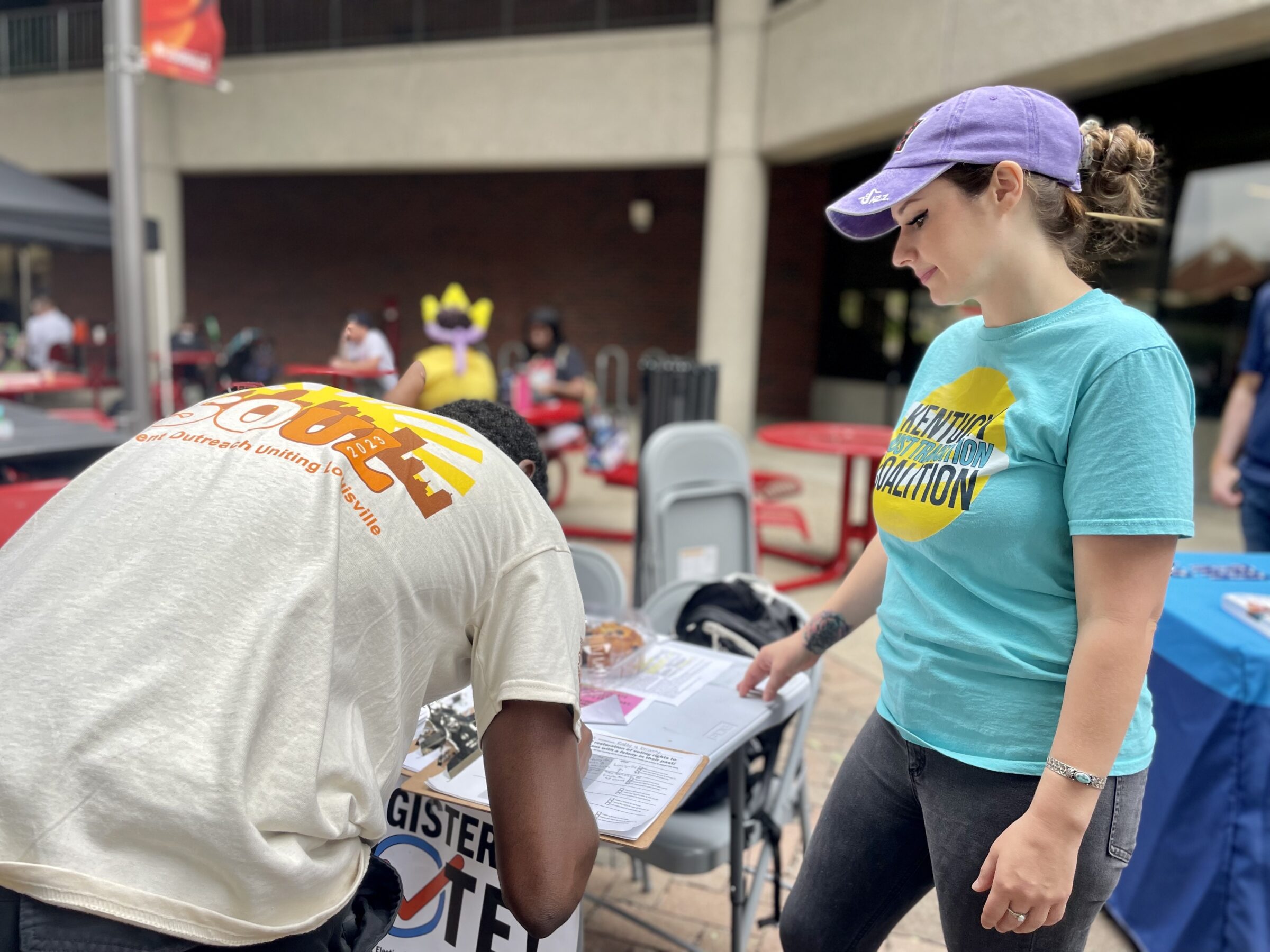

These coalition members also say it is no surprise that turnout has been so low among Kentuckians who were once barred from voting. “It’s almost like a secret,” said Teresa Forbes-Lopez, who works with Malone and says she was drawn to this activism through her interest in education reform. “The government is not pushing it out. It’s like they want to hold it back. When you let a person out, you should say, ‘Here are all the things you need to do,’ and that’s not happening.”
Beshear declined my request for an interview to talk about rights restoration and the limited impact of his order nearly four years ago. A spokesperson for his Justice and Public Safety Cabinet sent an email highlighting the online search tool that debuted in 2020, and also noting that Kentucky gives people leaving prison a printed “notice of restoration” that contains information on voter eligibility and registration.
Organizers working to ensure people covered by Beshear’s order know of their rights say they’re energized by the activism around rights restoration, but lament that it is so needed.
“So many people tell you, daily, that they don’t know they can register to vote. So many of them are eligible and don’t know,” said Lexington’s Jessica Clark, who got involved in voter outreach through her church. “They are so amazed to know they have their citizenship back, that they can vote.”
“They’re surprised, very surprised,” said Roseileen Fitts of Louisville, who is formerly incarcerated and remains disenfranchised. “Some people don’t even believe you when you tell them.”
Fitts, 32, is a mom, owns a cleaning business, and for years has been a frequent volunteer in Louisville, including mentoring the children of incarcerated parents through the YMCA. Now in recovery from addiction, she’d like to think she’s the sort of person Beshear had in mind when he spoke in 2020 about people “doing right” after previous felony convictions. She is not, of course, as she’ll be reminded next month, when she misses out on yet another election.
We met on the campus of the University of Louisville at an event to direct resources and support to people grappling with substance use disorders. That day alone, Fitts told me, she and her colleagues had met two people unaware their voting rights had been restored by Beshear’s order in 2019. Informing someone that, yes, they can legally vote is bittersweet, she said.
“Our government did nothing to inform people. They didn’t tell anyone. We are doing that. We have a phone list and we go out and find people,” Fitts said. “And we have so much more to do.”
People working to pick up the government’s slack say the Beshear administration could do much more than simple outreach to those it lifted from disenfranchisement.
Bryan Ford, a formerly incarcerated activist who is disenfranchised and runs a nonprofit to assist people in recovery from substance use disorders, said that, for one, probation and parole offices could mention voting more often. This, Ford argues, would have a public-safety benefit, and the data agree with him: research shows that people with past convictions who have their rights restored and engage in voting are less likely to be rearrested.
But as it is, Ford said, “Urinalysis and going to jail—that’s what probation talks to me about. That’s it.”
“You’ll send me a court-appointed lawyer for my plea bargain, but after I do whatever time, who’s going to tell me that one of the things I can do, besides go see my probation officer, is to go get my rights back?”
Advocates would be thrilled by even minor reforms. They say the online tool Beshear touted in that press conference, for example, often fails to accurately report whether someone is eligible to vote. Beshear has pledged to be vigilant about keeping the site in order, but many of those using it say it frequently returns false information—telling people who are indeed eligible to vote that they cannot, and vice-versa—and that sometimes it doesn’t function at all.
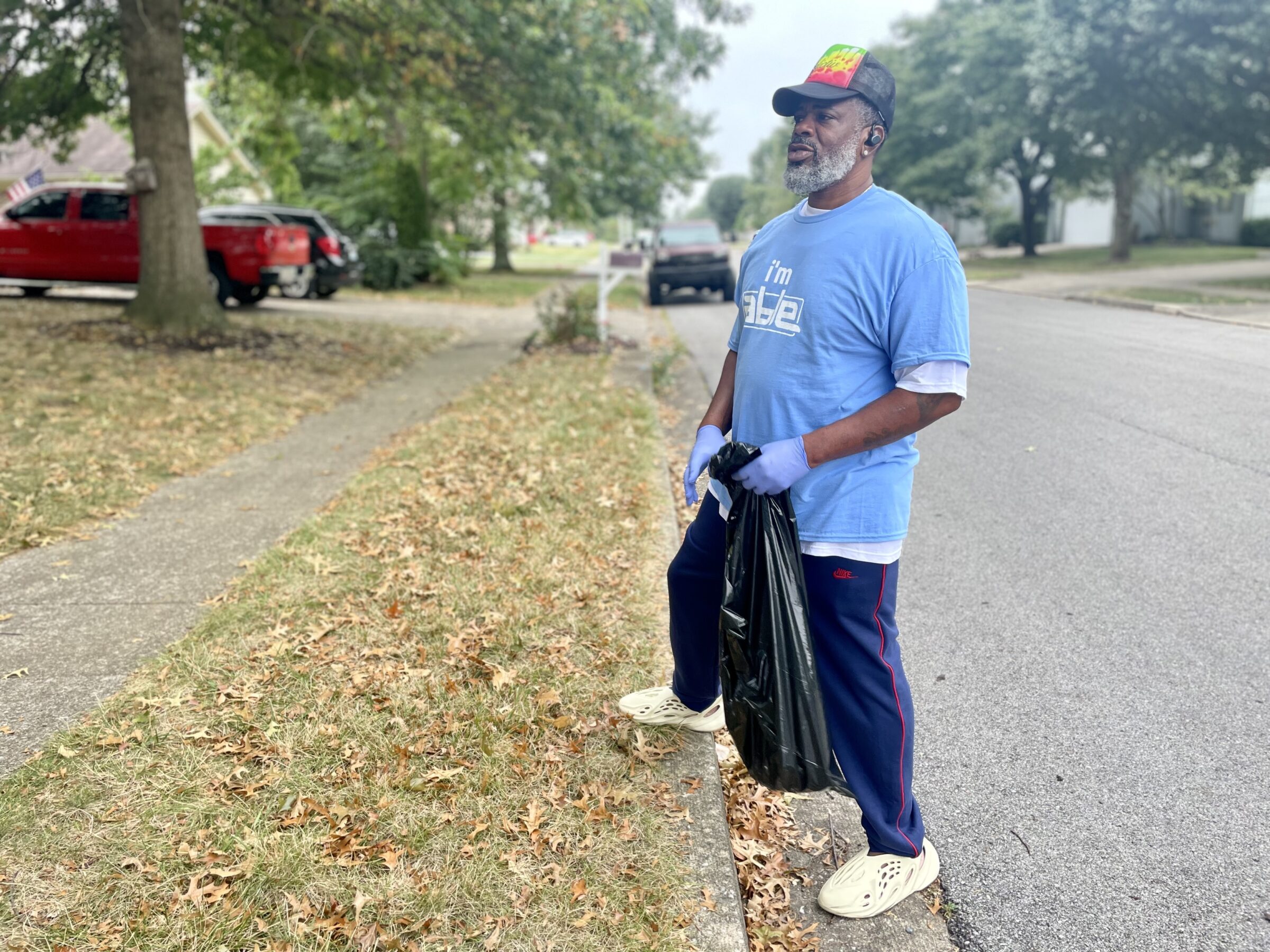

“We were in a jail yesterday and the link didn’t even work,” said Savvy Shabazz, a formerly incarcerated voting rights activist based in Louisville. “We just have to do the work on our own.”
Shabazz helps lead voter outreach and education efforts in Kentucky jails, where people held before trial often have the right to vote but are still routinely disenfranchised. Shabazz said some people in jails report difficulty getting voter registration forms, while others request mail ballots but never receive them. He said most jails in the state take no proactive steps to identify eligible voters in lockup and provide them ballot access around elections. Shabazz said that many sheriffs, who run local jails, haven’t allowed him and his colleagues inside to do voter outreach ahead of this year’s election.
“Voting is not a privilege; it’s a right,” he adds. “People’s rights are being violated when those jails are not allowing them to vote.”
The struggle to make jail voting easier, like the struggle to spread word of Beshear’s order, reminds Shabazz and other activists that they simply cannot trust the government to do the work of ensuring all eligible voters know of their rights and have ballot access.
Tip Moody, who is formerly incarcerated, says he learned he was allowed to vote again not from the governor’s office or any official government notice, but rather by happening upon a letter submitted by the League of Women Voters that was published in a newspaper. Moody, who now works for a small nonprofit that advocates for and seeks to amplify the voices of formerly incarcerated people, has often encountered people unaware that they are eligible to vote.
He’s also come across plenty of people disinclined to participate at all, even when aware they are able. “You would be amazed at how many are eligible but don’t want to register,” he said. That’s common in the U.S., where interaction with the criminal justice system is often predictive of turnout. A series of studies released in the past 15 years found participation ranging from five to 18 percent among people recently released from prison who have the right to vote. In February, Bolts reported on new research showing that simply being pulled over by a traffic cop was enough to make people in Florida less likely to vote.
Explained Marcus Jackson, who works with Moody and was imprisoned for 17 years, “The only time a lot of people, especially disenfranchised people, see politicians is during election cycles. We want people to understand why the vote is important, why they should show up at the polls, but we just haven’t had that type of investment in a lot of our communities.”
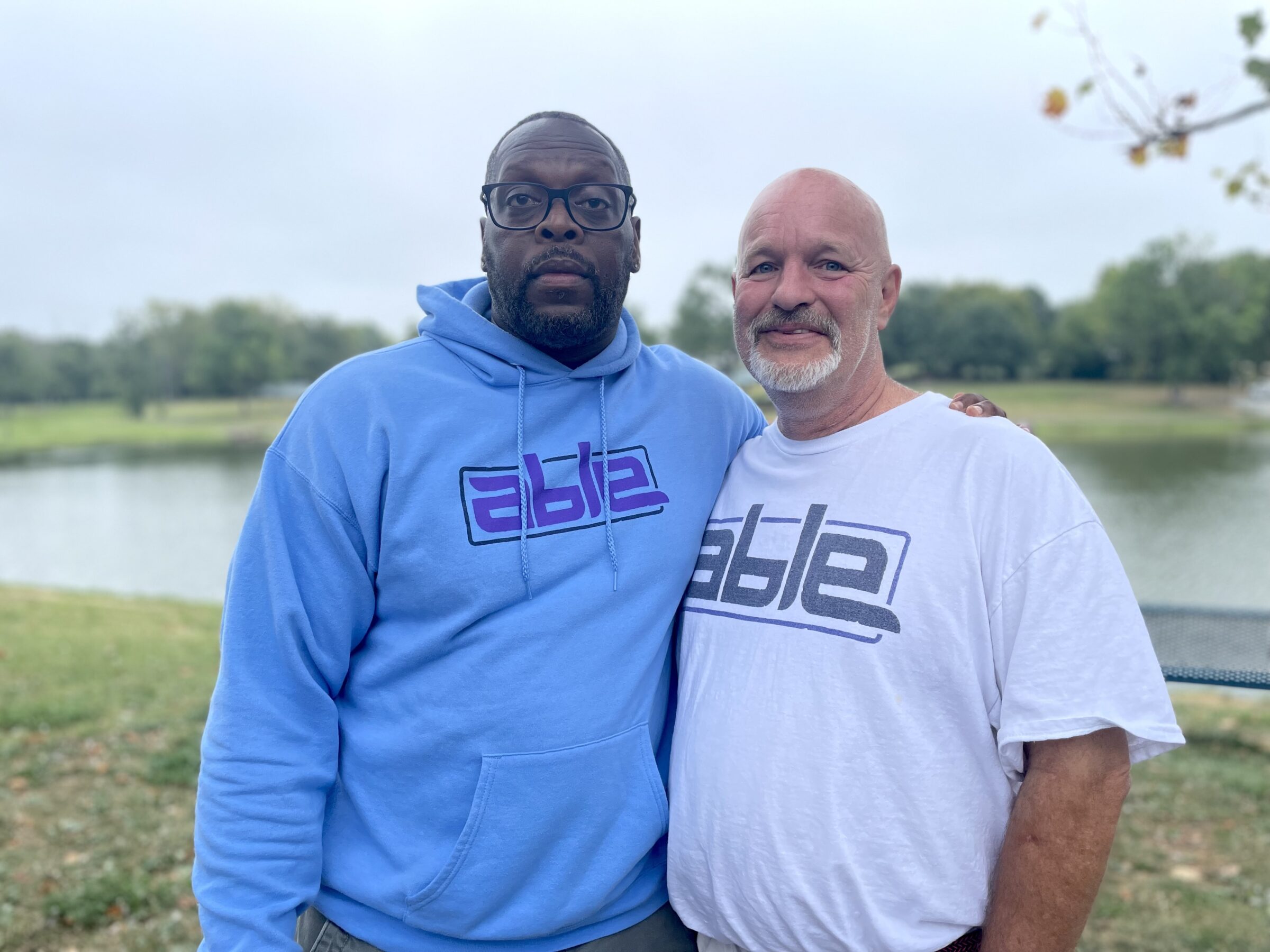

I met Moody and Jackson at a park in a suburb of Lexington in September. They and about 15 other men, all with past felony convictions, had come to Lake Mingo Park in Nicholasville to pick up trash and show face in their community—a way, they said, to remind passersby and themselves that they are worthy, valuable people, whether or not the government lets them vote.
“I still can’t vote, and it’s hurtful,” said Jackson, who lives in Frankfort. “Not everyone is going to be as persistent to consistently show up like this, but I’m highly motivated to be that example, so that they will allow people like me to vote.”
Many other people working in this space echoed Jackson and Moody in saying that feelings of democratic detachment or abandonment are most evident in poorer and often predominantly-Black sections of the state. Disenfranchisement, after all, falls hardest on Black Kentuckians, who are more than twice as likely to be blocked from voting, according to a recent report. As of 2016, one in four Black people of voting age in Kentucky could not vote; at nearly one in eight today, the rate is still alarmingly high compared to the rest of the country.
The longstanding and broad exclusion levied so strongly against Black people in Kentucky leaves many people feeling sidelined from a young age, activists said. Voting rights activists working to register people restored by Beshear sometimes visit local schools to pre-register teenagers on the cusp of voting age. They told me that the kids in poorer, more heavily-incarcerated areas tend to feel alienated from democracy in much the same way Jackson and Moody so often observe among adults with past felonies.
“Lexington Catholic—that’s where the rich kids are, and when I set my table up, they come up to register to vote like I’m giving something away,” Clark said. “At the public schools, I have to work the crowd. I have to be in their face to say, ‘Can I register you to vote?’ And they say, ‘maybe next time, or ‘I’ll think about it.’ I have to beg them: ‘Please let me register you to vote. Your vote is your voice.’”
Regina Harris, who works with Clark on voter outreach in schools, says she tries to talk about disenfranchisement and rights restoration when meeting students, but that those in wealthier areas typically avoid the topic. “What I do notice with the Catholic schools and the private schools,” Harris said, “is that the kids there want nothing to do with me when I talk to them about restoration of rights for felons. Their parents will literally move them aside.”
It might not seem like it, Jackson said when I met him at Lake Mingo Park, but the effort to get Black teenagers in underinvested, overpoliced areas to exercise their power as voters aligns closely with the work he’s doing to get his peers to see value in spending a morning hunting for litter in the suburbs. At 51, Jackson said, he’s learned that government officials aren’t likely to take up the project of empowering and mobilizing people excluded either formally or informally from democracy.
“My whole life, as a little Black boy, I always had to prove myself. No one accepted me on face value. It was always a stereotype or something that came along with me—the Black kid coming into the store to steal. That happened very early on in life.”
“It’s always been that ‘you’re not good enough.’ And once you get that felony conviction,” Jackson said, miming the swing of a baseball bat, “it’s ‘off with your head.’”
Stay up-to-date
Support us
Bolts is a non-profit newsroom that relies on donations, and it takes resources to produce this work. If you appreciate our value, become a monthly donor or make a contribution.


